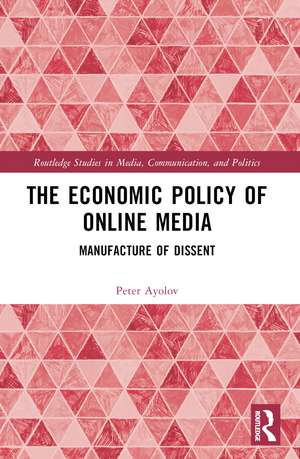The Economic Policy of Online Media: Manufacture of Dissent: Routledge Studies in Media, Communication, and Politics
Autor Peter Ayoloven Limba Engleză Paperback – 28 noi 2024
Following the media criticism tradition of Habermas and Chomsky, among others, the book shows how anger can motivate news consumption as the principle of divide-and-rule in the online media of the 21st century is systematically applied. The author posits that media addiction increases interest, therefore deliberate distortion of facts and the manufacture of dissent provide the media with a larger audience and this becomes the business model.
This insightful volume will interest researchers, scholars, and students of media economics, political economy of media, digital media, propaganda, mass communication, and media literacy.
| Toate formatele și edițiile | Preț | Express |
|---|---|---|
| Paperback (1) | 301.74 lei 6-8 săpt. | |
| Taylor & Francis – 28 noi 2024 | 301.74 lei 6-8 săpt. | |
| Hardback (1) | 888.54 lei 6-8 săpt. | |
| Taylor & Francis – 5 mai 2023 | 888.54 lei 6-8 săpt. |
Din seria Routledge Studies in Media, Communication, and Politics
-
 Preț: 314.09 lei
Preț: 314.09 lei -
 Preț: 277.61 lei
Preț: 277.61 lei -
 Preț: 152.13 lei
Preț: 152.13 lei -
 Preț: 310.12 lei
Preț: 310.12 lei - 18%
 Preț: 1000.27 lei
Preț: 1000.27 lei -
 Preț: 373.65 lei
Preț: 373.65 lei - 18%
 Preț: 1006.07 lei
Preț: 1006.07 lei -
 Preț: 367.24 lei
Preț: 367.24 lei -
 Preț: 376.10 lei
Preț: 376.10 lei - 18%
 Preț: 1001.84 lei
Preț: 1001.84 lei -
 Preț: 312.71 lei
Preț: 312.71 lei - 18%
 Preț: 942.36 lei
Preț: 942.36 lei -
 Preț: 309.84 lei
Preț: 309.84 lei - 18%
 Preț: 1054.43 lei
Preț: 1054.43 lei -
 Preț: 370.39 lei
Preț: 370.39 lei - 26%
 Preț: 764.20 lei
Preț: 764.20 lei - 16%
 Preț: 261.73 lei
Preț: 261.73 lei -
 Preț: 310.55 lei
Preț: 310.55 lei - 18%
 Preț: 1002.36 lei
Preț: 1002.36 lei - 18%
 Preț: 1007.06 lei
Preț: 1007.06 lei -
 Preț: 372.46 lei
Preț: 372.46 lei -
 Preț: 386.00 lei
Preț: 386.00 lei -
 Preț: 309.50 lei
Preț: 309.50 lei - 18%
 Preț: 1002.32 lei
Preț: 1002.32 lei - 18%
 Preț: 947.31 lei
Preț: 947.31 lei -
 Preț: 372.08 lei
Preț: 372.08 lei - 18%
 Preț: 1003.75 lei
Preț: 1003.75 lei -
 Preț: 370.14 lei
Preț: 370.14 lei - 8%
 Preț: 388.92 lei
Preț: 388.92 lei -
 Preț: 377.25 lei
Preț: 377.25 lei - 18%
 Preț: 1002.68 lei
Preț: 1002.68 lei
Preț: 301.74 lei
Nou
Puncte Express: 453
Preț estimativ în valută:
57.76€ • 62.76$ • 48.55£
57.76€ • 62.76$ • 48.55£
Carte tipărită la comandă
Livrare economică 21 aprilie-05 mai
Preluare comenzi: 021 569.72.76
Specificații
ISBN-13: 9781032461366
ISBN-10: 1032461365
Pagini: 136
Dimensiuni: 156 x 234 mm
Greutate: 0.25 kg
Ediția:1
Editura: Taylor & Francis
Colecția Routledge
Seria Routledge Studies in Media, Communication, and Politics
Locul publicării:Oxford, United Kingdom
ISBN-10: 1032461365
Pagini: 136
Dimensiuni: 156 x 234 mm
Greutate: 0.25 kg
Ediția:1
Editura: Taylor & Francis
Colecția Routledge
Seria Routledge Studies in Media, Communication, and Politics
Locul publicării:Oxford, United Kingdom
Public țintă
Academic, Postgraduate, and Undergraduate AdvancedCuprins
Introduction: the Civil Cold War online
1. Changing the paradigm of mass communication
1.1. The need for a new paradigm
1.2. The rise of dissent in the network society
1.3. The 'New World Information Order' dystopia
1.4. Dysfunctions in the propaganda model
2. Dissent and the theory of mass communication
2.1. 'Manufacture of consent'—Walter Lippmann
2.2. 'Democratic propaganda'—Edward Bernays
2.3. 'The spiral of silence'—Elizabeth Noelle-Neumann
2.4. 'The propaganda model'—Noam Chomsky and Edward Herman
2.5. 'The end of history'—Francis Fukuyama
2.6. 'Agenda setting'—Maxwell McCombs
2.7. 'Pseudo news'—Niklas Luhmann
2.8. 'Distorted communication'—Jürgen Habermas
3. Digital media as a risk to democracy
3.1. Digital capitalism and decorative democracy
3.2. Trust and dissent in democracy
3.3. Dissidents' dissent and cognitive infiltration
4. Mass media as dissent manufacture
4.1.The Bulgarian connection in the attack on the pope
4.2. The effects of the 'lying press' (Lügenpresse)
4.3. Doublespeak and conflict propaganda
4.4. The language of Russophilia/Russophobia
Conclusion: the dissent of the governed
1. Media hostility index
2. Angry citizens of the internet
3. Second-degree cybernetics and Kayfabe
4. Planned obsolescence of communication
1. Changing the paradigm of mass communication
1.1. The need for a new paradigm
1.2. The rise of dissent in the network society
1.3. The 'New World Information Order' dystopia
1.4. Dysfunctions in the propaganda model
2. Dissent and the theory of mass communication
2.1. 'Manufacture of consent'—Walter Lippmann
2.2. 'Democratic propaganda'—Edward Bernays
2.3. 'The spiral of silence'—Elizabeth Noelle-Neumann
2.4. 'The propaganda model'—Noam Chomsky and Edward Herman
2.5. 'The end of history'—Francis Fukuyama
2.6. 'Agenda setting'—Maxwell McCombs
2.7. 'Pseudo news'—Niklas Luhmann
2.8. 'Distorted communication'—Jürgen Habermas
3. Digital media as a risk to democracy
3.1. Digital capitalism and decorative democracy
3.2. Trust and dissent in democracy
3.3. Dissidents' dissent and cognitive infiltration
4. Mass media as dissent manufacture
4.1.The Bulgarian connection in the attack on the pope
4.2. The effects of the 'lying press' (Lügenpresse)
4.3. Doublespeak and conflict propaganda
4.4. The language of Russophilia/Russophobia
Conclusion: the dissent of the governed
1. Media hostility index
2. Angry citizens of the internet
3. Second-degree cybernetics and Kayfabe
4. Planned obsolescence of communication
Notă biografică
Peter Ayolov is Assistant Professor in the Faculty of Journalism and Mass Communication at Sofia University 'St. Kliment Ohridski', Bulgaria.
Descriere
This book explores the distortion of communication online, centred around the theory that the economic policy model of online media is primarily based on the systematic manufacture of dissent.
